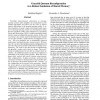412 search results - page 67 / 83 » A New Proof of the F5 Algorithm |
STOC
2001
ACM
15 years 12 months ago
2001
ACM
We study error-correcting codes for highly noisy channels. For example, every received signal in the channel may originate from some half of the symbols in the alphabet. Our main c...
110
click to vote
ATAL
2009
Springer
2009
Springer
Effective solutions for real-world Stackelberg games: when agents must deal with human uncertainties
15 years 6 months ago
How do we build multiagent algorithms for agent interactions with human adversaries? Stackelberg games are natural models for many important applications that involve human intera...
COLT
1999
Springer
15 years 4 months ago
1999
Springer
We present a unified framework for reasoning about worst-case regret bounds for learning algorithms. This framework is based on the theory of duality of convex functions. It brin...
117
click to vote
ICDCS
2000
IEEE
15 years 3 months ago
2000
IEEE
Providing shared-memory abstraction in messagepassing systems often simplifies the development of distributed algorithms and allows for the reuse of sharedmemory algorithms in the...
104
click to vote
CORR
2006
Springer
14 years 11 months ago
2006
Springer
In set-system auctions, there are several overlapping teams of agents, and a task that can be completed by any of these teams. The auctioneer's goal is to hire a team and pay...

